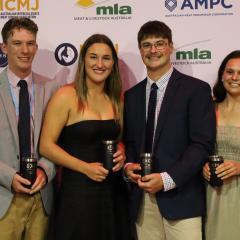
University of Queensland agribusiness students have made it to the final round of an international agricultural case study competition, honing their agricultural problem-solving skills.
Now in its 16th year, the International Food and Agribusiness Management Association’s (IFAMA) International Student Case Competition brings together students globally to address complex agricultural problems present on farms and in agribusinesses the world over.
UQ PhD candidate Gayathri Rajagopal, with three fellow UQ agribusiness students, excelled through the competition’s preliminary round, having devised strategies for Californian firm, Perfect Day.
“The preliminary round was held virtually, and we were suddenly ‘in charge’ of Perfect Day – a California-based, high-tech company that has developed a process to make dairy proteins… without the cows,” Mrs Rajagopal said.
“This amazing whey protein product – made using microflora and not from cows – had the equivalent nutrition, texture of its equivalent, while reducing environmental impact and eliminating animal welfare concerns.
“We had just 24 hours to extensively tackle questions like: what’s the best way to grow production? How should the market be developed? What’s the best way to create value for investors?
“The last five hours were definitely the most stressful, as we had to incorporate a lot of diagrams, graphs and financial calculations, but we made it on time!”
The team’s efforts earned them a place in the final round – being held on 21 June – with the winner heading to the IFAMA conference in Costa Rica in 2022.
Mrs Rajagopal believes the team – which also includes Adhitya Marendra Kiloes, Julia Checco and S.M. Mokaddes Ahmed Dipu – is strong thanks to its diversity.
“All four of us come from different backgrounds and are at different stages of our career and education,” she said.
“Three of us are doctoral candidates, but at different stages of our doctoral degrees, and one is a Master of Agribusiness student.
“The best thing about working in the agribusiness space is that it allows us to adopt a transdisciplinary approach to solving problems.”
The students have been training for the last four months under the guidance of academic advisor Dr Ammar Abdul Aziz, from UQ’s School of Agriculture and Food Sciences.
“For students and researchers in agribusiness, there’s no platform better than IFAMA to showcase their skills to the outside world,” Dr Abdul Aziz said.
“Solving real-world problems is critical for our students, letting them to apply years of study both in the classroom and in the field.
“And collaborating with other disciplines within the university is also important, bringing in different kinds of skill set into the team.
“I hope that the team’s success so far can inspire and motivate other agribusiness students at UQ to participate in this competition in years to come.
“And I’ll be barracking for them in the upcoming final round – they have the skills, knowledge and sheer talent – so I’m excited to see how they’ll go.”
Mrs Rajagopal is a PhD student at UQ’s ARC Industrial Transformation Training Centre for Uniquely Australian Foods, while all other team members are from UQ's School of Agriculture and Food Sciences.
More information about the competition can be found on the IFAMA website.
Media: Dominic Jarvis, dominic.jarvis@uq.edu.au, +61 413 334 924.



